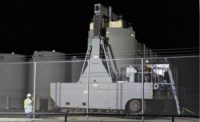Agreement Sets the Stage for Quick Cleanup of Vermont Yankee

Decommissioning of the shuttered Vermont Yankee nuclear power plant could begin as early as next year under a memorandum of understanding signed earlier this month by Vermont state agencies, tribal leaders, environmental groups, plant owner Entergy and cleanup firm NorthStar, which plans to purchase and decommission the nuclear plant.
A Nuclear Regulatory Commission (NRC) spokesman said the commission would likely decide on whether to transfer the license to NorthStar by the end of June. NorthStar and Entergy anticipate closing the deal by the end of 2018.
The agreement could set the stage for a new business model to decommission more than 40 nuclear plants that either have announced closure or are candidates for shutdown in the next few years.
NorthStar, along with partner Areva, formed a joint venture last year to pursue acquiring and decommissioning closing nuclear plants.
Under the agreement, originally announced in November 2016, Entergy would sell the plant, which was closed in 2014, to the New York-based industrial demolition firm NorthStar for a nominal amount. It would complete decommissioning and site decontamination by 2030.
That scenario speeds the cleanup timetable by more than 30 years. Under a previous agreement with the state, Entergy would have begun cleanup in 2053 and finished work by 2060. Accelerating the schedule could save millions.
The plant’s decommissioning trust fund had $581.5 million at the end of 2017. NorthStar estimates that cleanup of the plant will cost about $498.45 million and site restoration will cost about $25 million, according to a license transfer application filed with the US Nuclear Regulatory Commission.
Managing the spent fuel onsite through 2051 will cost another $287.8 million, which NorthStar expects to recoup from the US Dept. of Energy through litigation because the federal government has failed to establish a permanent nuclear waste storage facility.
NorthStar CEO Scott State says the existing decommissioning trust fund will be "more than adequate to cover NRC license termination and site restoration costs at the site. The NorthStar team’s expertise and earlier start reduces the overall cost of decommissioning.
Also, as the self-performing owner, NorthStar avoids the additional expenses in the original owner’s plan to delegate the management and oversite of the project to a third party."
Mike Twomey, vice president for external affairs of Entergy Wholesale Commodities said if Entergy were to decommission the plant, it would have to hire a contractor and add an internal management structure to manage the cleanup and demolition, adding more cost to the project.
After the sale was originally announced, community groups raised concerns that NorthStar did not have enough money for contingencies if something went wrong, and that it lacks enough experience in nuclear decommissioning.
The MOU signed March 2 requires NorthStar to increase its support agreement by $15 million, establish a $55-million escrow, make a $25-million subcontractor guarantee available and purchase $30 million in pollution legal liability insurance. Entergy has also agreed to an additional financial support of up to $30 million, with the possibility of another $40 million in support.
Additionally, NorthStar has agreed to site restoration standards and transparency during the process.
Still, the Conservation Law Foundation had reservations about the agreement and did not sign it.
“The buyer, NorthStar, has little of its own money on the line and will hold the contaminated site in a shell corporation,” wrote Sandy Levine, foundation staff attorney. “This shields them from liability. Unlike transferring ownership of an operating power plant, Vermont Yankee is closed, so it isn’t capable of generating revenue. NorthStar will make money by draining the cleanup funds. That may be good for NorthStar, but won’t protect Vermonters if the money runs out.”
NorthStar has never decommissioned a commercial nuclear reactor, but it has decontaminated and decommissioned five smaller research reactors.
The company is working with Areva Nuclear Materials, Burns & McDonnell and Waste Control Specialists.
Burns & McDonnell is providing engineering, license transfer and termination support, environmental and other technical services. “Basically, we’re on-call to provide any support NorthStar needs as they work through regulatory approvals processes and then the actual work of decontamination and dismantling Vermont Yankee,” says spokesman Roger Dick.
Areva will segment and package the plant’s nuclear reactor and other radioactive materials and ship them to a Waste Control Specialists site in Texas.





